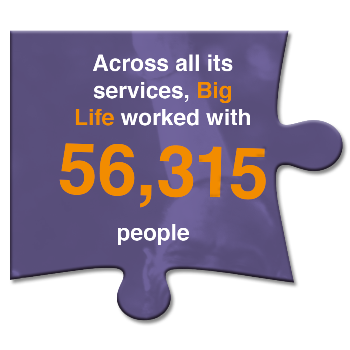News and views
Go back

Child poverty – it’s time to be outraged
Fay Selvan, Big Life CEO
I was asked to speak at an event last week on child poverty. After presenting some of the key statistics one of the audience asked – why aren’t we outraged? To be honest, I struggled with a reply – I am outraged.
Maybe the general population don’t know what it’s like to be poor in the UK today? Or everyone has bought that the country is broke and has to live within its means, so benefits and services for the people with the least are a luxury we can’t afford – who knows?
Whatever the rationale – for the first time in my lifetime child poverty is on the rise, and has been since 2010. Three out of every ten children live in poverty and the areas with the highest levels of child poverty are also the areas where it is fastest growing. The areas won’t come as a surprise to anyone – London, Birmingham, Manchester.
In Manchester 45% of children live in poverty – an increase of 2.7% in the last year. Cheetham and Longsight wards (where we have our schools) are the highest, with over half (54%) of children living in poverty.
The causes of this increase in child poverty are clear. The UK’s low wage economy with wage stagnation and zero-hour contracts has meant that you can’t work your way out of poverty. The swingeing cuts in benefits (tax credits, two child limit, LHA cap), together with the four year freeze in benefits and previously sub-inflation rises, has meant that the income to the poorest households have seen real income decline and fail to keep pace with inflation.
Add to this the housing crisis, leading to more poor people being housed in the Private Rented Sector. 56% of all children living in poverty now live in the Private Rented Sector, which accounts for 19% of all households (up from 11% in 2004). In Manchester alone there are more than 1,000 families living in temporary accommodation, 400 of these in homes out of the borough, meaning loss of connection with schools, friends and families.
If you are not outraged now, then you only need to look at the consequences of child poverty. For the first time in a century infant mortality is on the rise in the UK. That means more children are dying in their first year of life this year, than last year. Shockingly, more than six in every 1000 children born in Manchester die before their first birthday; that’s the same rate as Bulgaria, despite the average person in the UK having six times as much money as the average Bulgarian.
The impact of poverty carries on through life – only 37% of children in Manchester on free school meals leave school with five GCSEs grade A-C, compared to a national average of 61%. And the impact of poverty on healthy years of life has long been recognised –with differences of up to 15 years between rich and poor areas.
There is now a lot of academic evidence about the impact on poverty on mental health and wellbeing. Richard Wilkinson shows in his book The Spirit Level that social conditions are the biggest determinant of health, and the more unequal a society, the more problems that society has – crime, addiction, domestic abuse and homelessness. Interestingly he shows how it isn’t absolute poverty, but relative poverty, that is the problem. People who live in poverty in richer countries have lower self-worth and self-esteem. I recently heard a quote from a child who said they felt ashamed and couldn’t talk to anyone about the problems in their family. Peter Belmi from Virginia University recently published research showing that people from more well off families are more confident about their own skills and abilities, than people from poorer backgrounds. Poverty in childhood is an adverse experience that affects your whole life.
If you are now outraged, here are some links to great campaigns where you can find out more:
